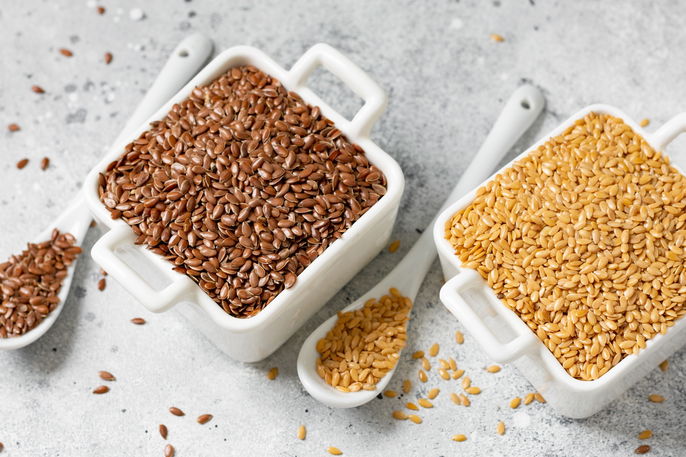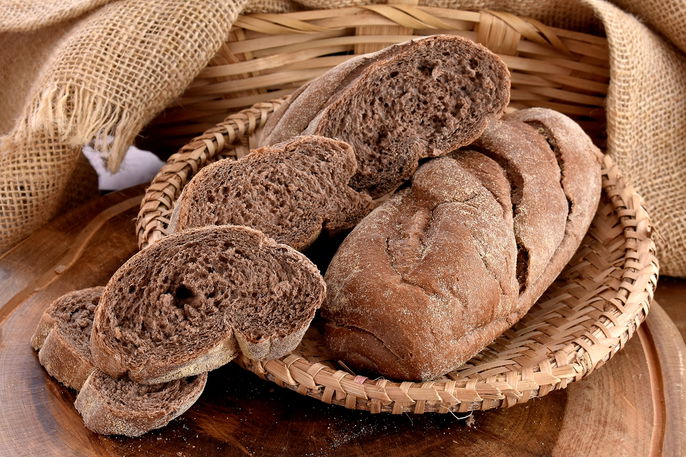Flaxseed benefits, like reducing inflammation and preventing conditions like high blood pressure, atherosclerosis or cardiac arrest, can be achieved by incorporating them into your diet. They are a great source of omega-3, vitamin E and magnesium, which are nutrients with healing and anti-inflammatory properties.
Flaxseed benefits are also derived from its high fiber content, making it an effective, natural laxative. This seed can increase stool volume and stimulate natural bowel movements to help prevent and manage constipation.
Flaxseeds can be found in gold and brown varieties, and typically have a mild, nutty taste. They can be purchased at supermarkets or natural health stores, and added to rice, yogurts, juices, salads, and batters (like cake, bread, pancake and cookies).

List of benefits
Regularly consuming flaxseeds can offer many health benefits, such as:
1. Fighting constipation
Flaxseeds are rich in rich insoluble fiber, which is a type of fiber that increases stool volume and stimulates natural bowel movements. As such, flaxseed can help with easy stool elimination and can help to fight constipation. Read more about high fiber foods that can help to manage constipation and regular bowel movements.
2. Maintaining eye health
Flaxseeds contain lutein and zeaxanthin, which are carotenoids with antioxidant action. They help to protect the retina against UV rays and blue light from screens like computers and cell phones. Therefore, flaxseeds can help to maintain eye health and prevent illnesses like cataracts or diabetic retinopathy.
3. Managing blood sugar
Because it is rich in fiber, flaxseeds can reduce how quickly sugar is absorbed from food, which can help to manage glucose levels in the blood and prevent insulin resistance and diabetes.
Flaxseeds have great amounts of omega-3 and omega-6, which are health fats with antioxidant and anti-inflammatory action. These can help to improve how insulin works, which can lead to better diabetes management.
4. Reducing cholesterol and triglycerides
Flaxseeds are rich in fibers that reduce fat absorption in the gut. They can also reduce cholesterol production in the liver and decrease cholesterol and triglyceride levels in the blood.
5. Promoting weight loss
Because it contains great amounts of fiber, flaxseeds can keep you fuller for longer and reduce over-eating throughout the day, which can lead to weight loss. Check out other foods to lose weight that you can incorporate into your diet.
6. Preventing cardiovascular diseases
Flaxseeds contain omega-3, selenium, omega-6 and vitamin E, which are nutrients with antioxidant and anti-inflammatory properties. These can improve arterial health and decrease inflammation, which can prevent diseases like high blood pressure, heart attack and atherosclerosis.
7. Preventing cancer
The fibers in flaxseeds can nourish the good bacteria in the gut. This bacteria is important for reducing inflammation and fighting harmful bacteria. Regular consumption of flaxseeds can help to maintain balanced flora levels in the gut and prevent the development of intestinal cancer.
Flaxseeds also contain great amounts of omega-3, omega-6, zeaxanthin and lutein, which are compounds with antioxidant properties that help to fight excessive free radicals and inhibit the proliferation of cancer cells.
8. Preventing osteoporosis
Flaxseeds are a great source of phosphorus, calcium and magnesium, which are minerals that important for the formation and maintenance of bone cells. They are essential for the prevention of osteoporosis.
Potassium also helps to neutralize excess acid, and therefore flaxseeds can help to increase pH levels in the body, and reduce calcium elimination in the urine. Both of these factors play a role in preventing osteoporosis.
9. Maintaining brain health
Flaxseeds contain great amounts of omega-3, a type of healthy fat that contains antioxidant and anti-imflammatory actions that improve neuron function. This can maintain brain health and prevent memory loss and Alzheimer’s.
10. Fighting anxiety and depression
Because it contains tryptophan, an aminoacid that is essential for serotonin production, flaxseeds can help to improve mood and fight depression and anxiety.
Also recommended: Tryptophan: Health Benefits, Foods & Recommended Dose tuasaude.com/en/tryptophanFlaxseed properties
Flaxseed has antioxidant, antidiabetic, anti-inflammatory, lipid-lowering, anticancer and anxiolytic properties.
This is because they are rich in fiber, omega-3, omega-6, lutein, zeaxanthin, selenium, vitamin E, phosphorus, calcium, magnesium and tryptophan, which contribute to their health benefits.
Nutritional information
The following table outlines the nutrients found in 100 g of flaxseeds, which is equivalent to about 14 tablespoons:
It is important to highlight that to obtain all of the benefits garlic has to offer, it should be incorporated into a healthy and balanced diet and you should exercise regularly.
The recommended amount of flaxseed to obtain its health benefits is one tablespoon per day. You should not consume more than 4 or 5 tablespoons of flaxseed in a day, as excessive fiber intake can lead to constipation, diarrhea, gas and bloating.
How to use
It is important to purchase flaxseed as a flour or to grind the flaxseeds at home, as the gut is unable to breakdown and absorb all the nutrients found in a whole flaxseed. These seeds should be stored in a sealed recipient and protected from direct light.
Flaxseeds have a light taste and can be added to rice, yogurts, juices, salads and used in batters for cakes, bread, pancakes and cookies.
Read more about flaxseed oil and how it can be used.
Healthy flaxseed recipes

Check out our recipes below to learn how to incorporate flaxseeds into your diet:
1. Flaxseed bread
Ingredients:
- 2 ½ cups of whole wheat flour;
- 2 ½ cups of white flour
- 2 cups of rye flour
- 1 cup of flaxseed flour
- 1 tablespoon of baking powder
- 1 teaspoon of honey
- 2 teaspoons of butter
- 2 ½ cups of warm water
- 2 teaspoons of salt
- 1 egg, mixed to brush the batter before baking
How to prepare:
Preheat the oven to 350ºF (or 180ºC). Mix all ingredients in a large bowl and kneed until you obtain a homogenous, smooth batter. Cover the batter with a tea cloth and allow to sit for 30 minutes. Then mold into separate bun shapes and brush with the egg mix. Bake for 40 minutes.
2. Banana and flaxseed pancakes
Ingredients:
- 1 banana
- 2 tablespoons of oats
- 1 egg
- 1 teaspoon of flaxseed flour
- Cinnamon to taste
- A dab of honey
How to prepare:
thMash the banana with a fork. Add the egg, oats and flaxseeds, and mix with a spoon. Heat an anti-stick frying pan and pour a small amount of batter once hot. Cook on both sides, then transfer to a plate. Sprinkle with cinnamon and add honey, then serve.






























